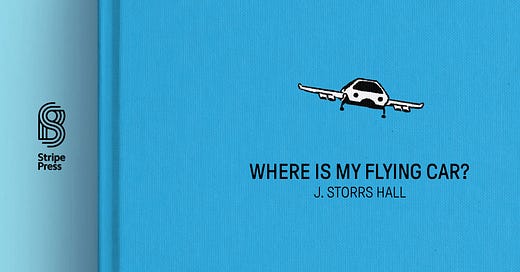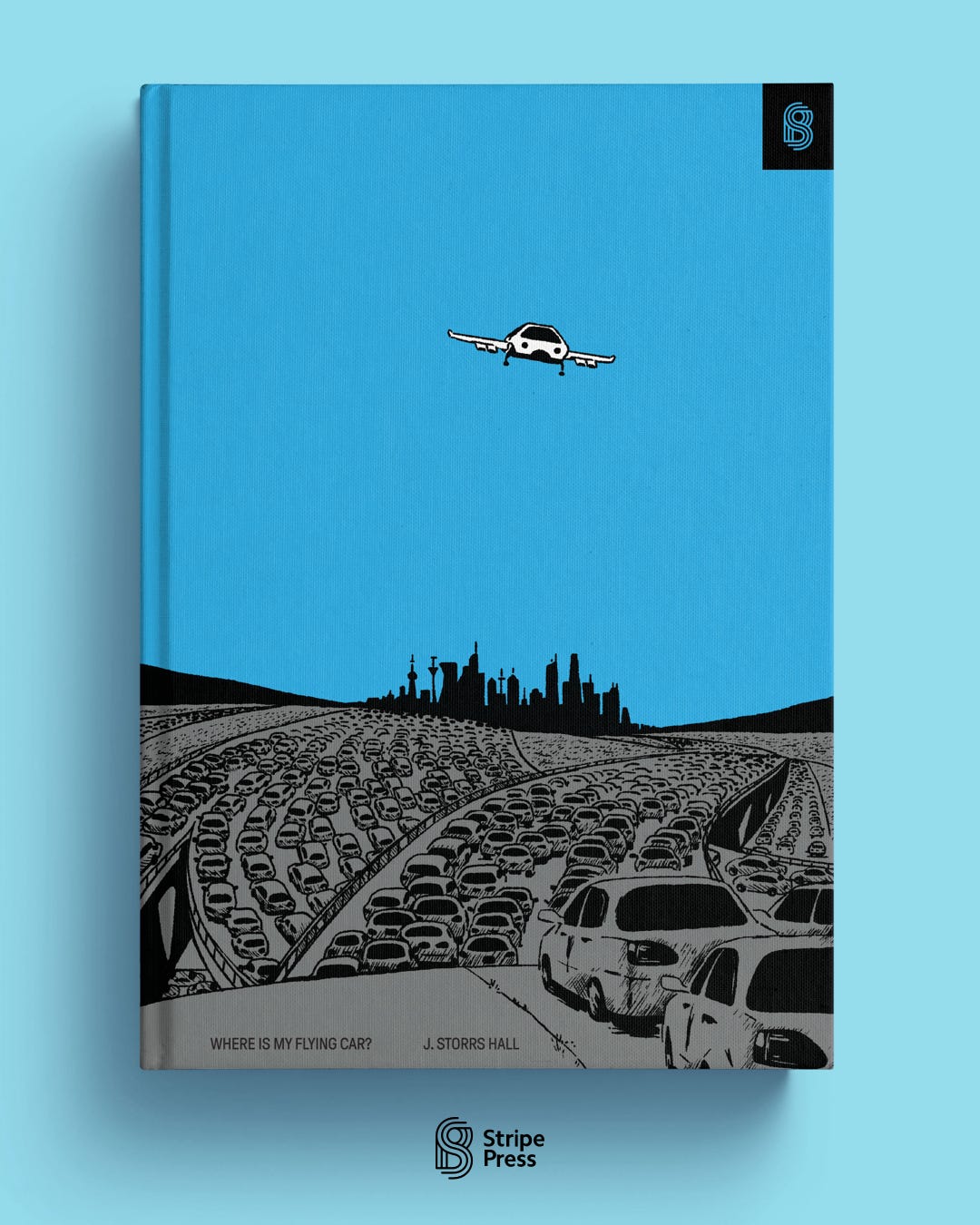Where is My Flying Car featured in Works In Progress
Five new articles about the book and an interview with author J. Storrs Hall
Our friends at Works in Progress just released a special issue of their magazine on our book, Where is My Flying Car. Below is a section from their newsletter, in which they explain a bit about the issue. You can subscribe to the Works in Progress newsletter here.
We were promised flying cars, and instead all we got was instantly accessible archives of all the knowledge and art the world has ever produced. But still, in 2022 – George Jetson’s birth year, apparently — where are the flying cars?
In his 2021 book for Stripe Press, J. Storrs Hall asked the same question. Attempting to answer it led him to a much larger puzzle: why do we seem to have stagnated more broadly? He considers the question from every angle: culture, economics, politics, regulation, and more. Since the book has come out, the stagnation he identifies has seemed to become even more urgent. Are we stagnating? Why? And if we are, what can we do? Some of our favorite authors answer these questions in our first Special Issue of Works in Progress.
Maybe it all comes back to energy. Storrs Hall revealed in his book that per capita energy consumption has basically flatlined since the 1970s. So maybe it’s no coincidence that the ‘Great Stagnation’ seems to have set in around the same time. Our lead essay, by Ben Reinhardt, imagines a world of energy abundance – a ‘fusionpunk’ vision of what might be if energy was too cheap to even meter.
The illustration of the man and his not-yet flying car connected to the piece was created by Joshuah X. Miranda, a designer at Stripe Press. It was an early cover for the Press edition of the book. You can find more of his work here.
Storrs Hall describes nanotechnology as being one of our highest potential technologies – something completely transformative that might already be affecting almost every element of our lives today if it had not been snuffed out. Eli Dourado writes that nanotechnology should be no more thought of as science fiction than artificial intelligence now is – not least because organic nano-scale technology is already ubiquitous in the natural world.
Dying in a plane crash is pretty costly, and most of us are happy to pay a bit in terms of economic output to minimize that kind of danger in our lives. But how much poorer does regulation really make us? Is it possible that Americans could have incomes three times higher if government regulation hadn’t exploded since the 1940s, as Storrs Hall argues? Economists Ryan Murphy and Colin O’Reilly argue it isn’t, in their piece Anti-growth safetyism. As the title suggests, it is the societal tendency they term ‘Anti-Growth Safetyism’ might be holding us back anyway, even if it is not making us a full three times poorer.
But what’s so good about flying cars anyway? Would you really prefer to have one if it meant giving up the internet, and all the access to knowledge, culture and communication that that’s given the world? Adam Hunt questions whether we really have slid into stagnation, or whether it’s the measurements that are wrong.
We once lived in a caveat emptor world. If you bought snake oil, drank the snake oil, and it made you sick, you only had yourself to blame. But nowadays we hold businesses liable for the damage their products do to their customers. Seems fair enough – but did this kind of product liability strangle flying cars at birth? Brian Potter argues that, actually, litigiousness probably isn’t at fault, even if it did lead to some oddities (like DIY airplane kits replacing pre-built planes, so the liability fell with the purchaser).
Finally, Stripe Press’s Tamara Winter interviews J Storrs Hall. Among other things, they discuss the ‘Machiavelli Effect’, where established figures in a field resist change because it threatens their positions and status. He reckons that this is a more or less unavoidable pathology of a wide range of institutional types, not just universities and scientific journals. If that’s true, then some kind of general solution to it, that would work across lots of different domains, could be pretty valuable.
We experimented with small animations throughout the pieces in this issue. They were created by Venus Krier. You can find more of her work here. Let us know what you think of them too, and if you would like to see more.
We’ll be back next month with the next regular issue of Works in Progress.
If you enjoyed this issue and love Stripe Press, make sure to subscribe to and follow Works in Progress. We have some exciting collaborations in the works for 2023.
— Tamara Winter, Stripe Press Commissioning Editor





